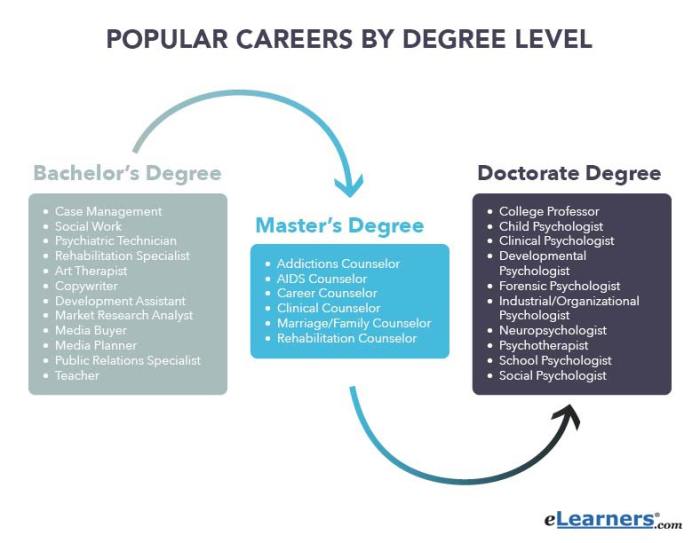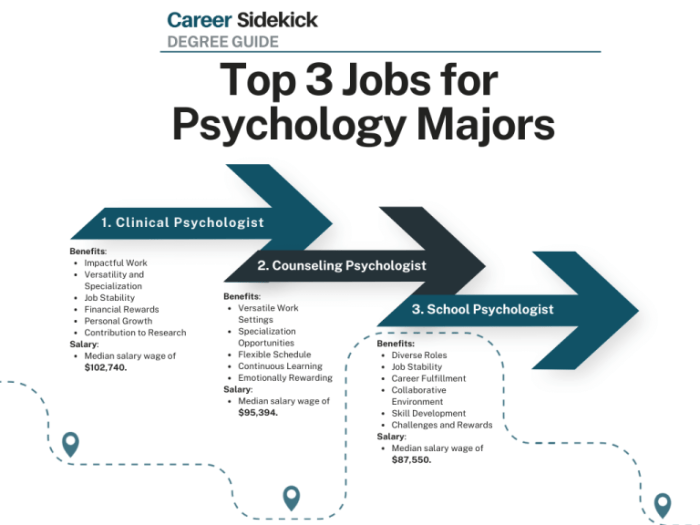What jobs can I get with a psychology degree opens up a world of possibilities for those passionate about understanding human behavior. Whether you’re intrigued by the intricacies of the mind or eager to apply psychological principles in various settings, a psychology degree serves as a versatile foundation. From mental health to corporate environments, this degree offers pathways into numerous professions that require a deep understanding of people and their motivations.
Graduates can explore careers in clinical psychology, counseling, human resources, and more, depending on their educational background and interests. Moreover, skills such as critical thinking, empathy, and effective communication developed during studies significantly enhance employability and workplace interactions, making psychology graduates highly sought after in diverse fields.
Career Opportunities with a Psychology Degree
A psychology degree opens the door to a variety of career paths across diverse industries. Graduates can apply their understanding of human behavior in settings ranging from healthcare to education, ensuring a meaningful impact in their chosen fields. The versatility of this degree allows for numerous job opportunities that cater to different interests and skill sets.The job market for psychology graduates is broad, with numerous roles available for both bachelor’s and master’s degree holders.
Depending on the level of education, graduates can find positions in various sectors, including healthcare, education, social services, and corporate environments.
Common Jobs for Psychology Graduates
Many psychology graduates find fulfilling roles that utilize their expertise in understanding cognitive processes and emotional responses. Here are some of the most common job titles associated with a psychology degree:
- Psychological Technician: Assists psychologists in providing patient care and conducting assessments.
- Human Resources Specialist: Utilizes psychology to enhance workplace dynamics, recruitment, and employee engagement.
- School Counselor: Works within educational institutions to support students’ mental health and academic performance.
- Substance Abuse Counselor: Aids individuals struggling with addiction, using therapeutic techniques to promote recovery.
- Market Research Analyst: Applies psychological principles to analyze consumer behavior and preferences for marketing strategies.
Industries Hiring Psychology Degree Holders
Psychology graduates are in demand across various industries, each offering unique roles that leverage their understanding of human behavior. Some of the notable sectors include:
- Healthcare: Positions in hospitals, clinics, and rehabilitation centers focusing on mental health.
- Education: Opportunities in schools and universities providing counseling and support services.
- Corporate Sector: Roles in human resources, organizational development, and training programs.
- Social Services: Employment in non-profit organizations and community outreach programs.
- Government: Positions in public health and policy development, focusing on mental health initiatives.
Differences in Job Roles for Bachelor’s vs. Master’s Degree Holders
The level of education significantly influences the types of job roles available to psychology graduates. Bachelor’s degree holders may qualify for entry-level positions, while those with a master’s degree can access more advanced roles requiring additional expertise.Bachelor’s degree holders often assume roles such as:
- Psychological Technician
- Recruitment Assistant
- Case Manager in social services
In contrast, master’s degree holders are typically eligible for more specialized positions, such as:
- Licensed Professional Counselor
- Clinical Psychologist (with further training)
- Industrial-Organizational Psychologist
“A master’s degree in psychology can enhance employment opportunities and potential salary, allowing graduates to take on more responsibility and leadership roles.”
Completing a master’s degree can vary greatly depending on the program and your pace, typically taking around two years if pursued full-time. However, for those juggling work or other commitments, it might extend longer. To understand the timeline better, check out this insightful article on how long does it take to complete a master’s degree.
Skills Developed Through a Psychology Degree

A psychology degree equips students with a diverse set of skills that are not only applicable within the field of psychology but also highly sought after across various professions. These skills are crucial in navigating the complexities of human behavior and interactions, making psychology graduates valuable assets in the job market. Understanding and applying these skills can enhance both individual career prospects and workplace dynamics.The study of psychology fosters critical thinking, analytical abilities, and effective communication.
Graduates learn to assess situations, interpret data, and analyze behaviors, which are vital skills in any professional setting. Additionally, the strong foundation in research methods and statistical analysis gained through psychology studies enables graduates to make informed decisions based on evidence. Below are some key skills developed through a psychology degree and their implications in the workforce.
Interpersonal Skills and Workplace Dynamics
Interpersonal skills acquired during psychology studies significantly enhance workplace dynamics. They enable graduates to effectively collaborate with colleagues, understand team dynamics, and navigate conflicts. The following points illustrate how these skills contribute positively to a work environment:
- Empathy: The ability to understand and share the feelings of others fosters a supportive workplace culture.
- Active Listening: Engaging fully in conversations improves communication and minimizes misunderstandings.
- Conflict Resolution: Skilled psychology graduates can mediate disputes and facilitate discussions, promoting harmony among team members.
- Cultural Competence: Understanding diverse perspectives ensures inclusivity and respect for all employees, enhancing team cohesion.
The application of these interpersonal skills leads to improved morale, productivity, and employee retention.
Translating Psychological Theories into Practical Job Skills
Psychological theories provide a framework for understanding human behavior, and this knowledge can be translated into practical skills that enhance employability. Here are methods to apply psychological principles in professional settings:
- Behavioral Analysis: Utilizing behavior modification techniques to influence positive changes in employee performance.
- Motivational Strategies: Applying theories such as Maslow’s Hierarchy of Needs to design effective reward systems that boost employee motivation.
- Group Dynamics: Understanding Tuckman’s stages of group development to facilitate team-building activities that enhance collaboration.
- Stress Management Techniques: Implementing psychological strategies for coping with stress can improve employee well-being and productivity.
By integrating psychological theories into the workplace, graduates can develop innovative solutions and promote a healthier work environment, ultimately leading to organizational success.
Specialized Fields within Psychology
The field of psychology encompasses various specialized areas, each catering to different aspects of human behavior and mental processes. These specializations offer unique job prospects and allow professionals to work in diverse settings, impacting individuals and organizations in significant ways. Understanding these specialized fields is essential for anyone considering a career in psychology.
Clinical Psychology, What jobs can I get with a psychology degree
Clinical psychology focuses on diagnosing and treating mental health disorders. Clinicians often work in hospitals, private practices, or community health centers. They provide therapy, conduct psychological assessments, and develop treatment plans tailored to individual client needs.
- Clinical Psychologist
- Psychiatric Technician
- Substance Abuse Counselor
- Clinical Neuropsychologist
Educational Psychology
Educational psychology centers on how people learn and the best practices for teaching. Professionals in this field often work in educational institutions, providing insights into effective teaching methods, learning processes, and special education interventions.
- School Psychologist
- Educational Consultant
- Instructional Coordinator
- Researcher in Learning Sciences
Industrial-Organizational Psychology
Industrial-organizational psychology applies psychological principles to the workplace, focusing on employee behavior, performance, and well-being. Practitioners in this field help organizations improve productivity and enhance employee satisfaction.
- HR Specialist
- Organizational Development Consultant
- Talent Management Coordinator
- Workplace Psychologist
Developmental Psychology
Developmental psychology examines the psychological growth of individuals throughout their lifespan. Specialists often focus on how people change from infancy through old age, studying cognitive, emotional, and social development.
- Developmental Psychologist
- Child Psychologist
- Geropsychologist
- Research Scientist in Developmental Studies
Forensic Psychology
Forensic psychology intersects psychology and the legal system, providing expert insights in criminal cases, custody disputes, and competency evaluations. Forensic psychologists often serve as consultants to legal professionals and may testify in court.
- Forensic Psychologist
- Legal Consultant
- Court Evaluator
- Researcher in Criminal Behavior
Health Psychology
Health psychology focuses on the psychological aspects of physical health and illness. Professionals in this area work to promote healthier lifestyles, manage chronic conditions, and improve healthcare outcomes.
Selecting the right degree program is crucial for your academic and professional journey. It’s essential to evaluate your interests, career goals, and the skills you wish to develop. For guidance on making this important decision, explore our detailed resource on how to choose the right degree program for me , ensuring you find the perfect fit for your aspirations.
- Health Psychologist
- Clinical Health Psychologist
- Public Health Educator
- Wellness Coach
Social Psychology
Social psychology studies how individuals influence and are influenced by their social environments. This specialization can lead to careers in academia, marketing, or community organization, focusing on group behavior and social interactions.
- Social Psychologist
- Market Research Analyst
- Community Outreach Coordinator
- Policy Analyst
Further Education and Certifications: What Jobs Can I Get With A Psychology Degree

Pursuing a psychology degree provides a strong foundation for various career paths, but further education and certifications can significantly enhance a graduate’s job prospects. Advanced qualifications not only equip individuals with specialized knowledge but also demonstrate a commitment to professional development, making them more competitive in the job market. Many psychology graduates consider obtaining additional certifications or degrees that align with their career goals.
These credentials can open doors to advanced career opportunities and specialized fields within psychology.
Certifications and Degrees to Enhance Career Prospects
Several certifications and graduate degrees can provide an edge in the psychology field. The following list highlights notable options for psychology graduates seeking to expand their qualifications:
- Master’s Degree in Psychology: A master’s degree allows graduates to specialize in areas such as clinical psychology, counseling, or industrial-organizational psychology, enhancing their expertise and job eligibility.
- Doctorate in Psychology (PhD or PsyD): A doctoral degree is essential for those aiming to become licensed psychologists, conduct research, or teach at the university level.
- Clinical Licensure (LPC, LCSW): Obtaining licensure as a professional counselor or social worker enables graduates to provide therapy and counseling services, broadening their career options.
- Certifications in Specializations: Certifications in areas such as trauma-informed care, neuropsychology, or school psychology can enhance qualifications and signal expertise to employers.
- Board Certification: Gaining board certification in a specialty area demonstrates a higher level of competence and can be a deciding factor for employers.
Benefits of Pursuing Graduate Education
Graduate education offers numerous advantages for psychology graduates. Higher education levels often correlate with better job prospects, higher salaries, and increased job responsibilities. Advanced degrees provide deeper knowledge of psychological theories, research methodologies, and practical applications, leading to enhanced skills in critical thinking and problem-solving. Additionally, pursuing graduate education can facilitate networking opportunities and connections with professionals in the field, which are invaluable for career advancement.
Choosing the Right Continuing Education Program
Selecting the appropriate continuing education program is crucial for achieving career advancement in psychology. Factors to consider include personal career goals, program accreditation, faculty expertise, and the curriculum offered. A structured approach to selecting a program can include the following steps:
- Assess Career Goals: Identify your long-term professional objectives and how additional education aligns with them.
- Research Accreditation: Ensure that the program is accredited by relevant professional bodies, which guarantees quality education and is often required for licensure.
- Evaluate Curriculum: Examine course offerings to ensure they meet your areas of interest and provide necessary skills for your desired career path.
- Connect with Alumni: Reach out to program graduates to gain insights into their experiences and career outcomes post-graduation.
- Consider Flexibility: Look for programs that offer flexible scheduling options, such as online courses or part-time enrollment, to accommodate your personal and professional commitments.
“Investing in further education not only enhances your skills but also increases your marketability in the competitive field of psychology.”
Networking and Professional Development

Building a robust professional network is crucial for psychology graduates aiming to advance their careers. Networking not only opens doors to job opportunities but also allows you to connect with mentors, share insights, and learn from others in the field. Engaging in networking activities can significantly enhance your understanding of the industry and provide valuable resources for career development.Internships and volunteer work serve as invaluable stepping stones for acquiring relevant experience in psychology.
They provide practical exposure to the field, allowing you to apply theoretical knowledge in real-world settings. Gaining hands-on experience through internships or volunteering can set you apart when seeking employment, as it demonstrates your commitment and familiarity with the industry.
Strategies for Building a Professional Network
Establishing a professional network in psychology requires intentionality and effort. Here are effective strategies to build and maintain your network:
- Attend Local and National Conferences: Engaging with industry leaders and peers at conferences enhances your visibility in the field and allows for meaningful interactions.
- Join Professional Organizations: Becoming a member of organizations such as the American Psychological Association (APA) provides access to valuable resources, webinars, and networking events.
- Utilize Social Media: Platforms like LinkedIn offer opportunities to connect with professionals, follow industry trends, and join relevant groups for discussions.
- Participate in Workshops and Seminars: These events are excellent opportunities to gain insights and meet professionals who share your interests.
- Network with Alumni: Reaching out to alumni from your program can lead to mentorship opportunities and valuable connections within the industry.
Importance of Internships and Volunteer Work
Internships and volunteer roles are essential for gaining practical experience and enhancing your resume. Engaging in these opportunities provides the following benefits:
- Real-World Experience: Internships allow you to apply classroom knowledge in clinical, research, or organizational settings.
- Skill Development: You’ll gain critical skills such as communication, assessment, and research methodologies that are vital in psychology.
- Networking Opportunities: Working alongside professionals opens doors to mentorship and job opportunities in the future.
- Resume Enhancement: Relevant experience makes you a more attractive candidate to potential employers.
- Understanding Career Paths: Exposure to different roles helps you identify your interests and career trajectory within psychology.
Utilizing Professional Organizations and Conferences
Leveraging professional organizations and conferences can significantly enhance your career growth in psychology. Here’s how to maximize these resources:
- Stay Informed: Regularly check for newsletters or updates from organizations to remain aware of trends, research, and job openings.
- Participate Actively: Volunteer for committees or projects within organizations to gain visibility and contribute to the community.
- Attend Networking Events: Utilize events specifically designed for networking to meet professionals and share your goals.
- Present Your Work: If applicable, submit your research for presentation at conferences, showcasing your expertise and dedication to the field.
- Follow-Up: After meeting professionals, follow up with a thank-you message or connect on social media to maintain the relationship.